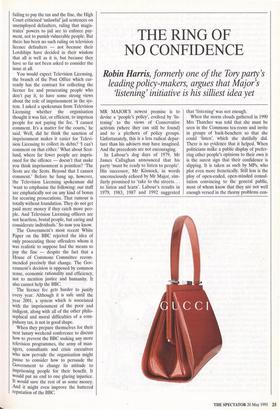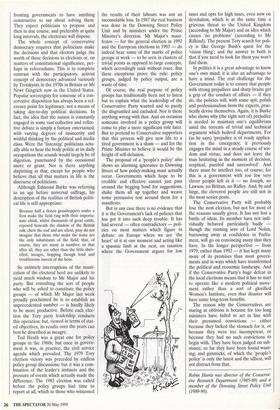THE RING OF NO CONFIDENCE
Robin Harris, formerly one of the Tory party's
leading policy-makers, argues that Major's `listening' initiative is his silliest idea yet
MR MAJOR'S newest promise is to devise a 'people's policy', evolved by 'lis- tening' to the views of Conservative activists (where they can still be found) and to a plethora of policy groups. Unfortunately, this is a less radical depar- ture than his advisers may have imagined. And the precedents are not encouraging.
In Labour's dog days of 1979, Mr James Callaghan announced that his party 'must be ready to listen to people'. His successor, Mr Kinnock, in words unconsciously echoed by Mr Major, sim- ilarly promised to 'take to the streets.. . to listen and learn'. Labour's results in 1979, 1983, 1987 and 1992 suggested that 'listening' was not enough.
When the storm clouds gathered in 1990 Mrs Thatcher was told that she must be seen in the Commons tea-room and invite in groups of back-benchers so that she could 'listen', which she dutifully did. There is no evidence that it helped. When politicians male a public display of prefer- ring other people's opinions to their own it is the surest sign that their confidence is slipping. It is taken as such by MPs, who plot even more frenetically. Still less is the ploy of open-ended, open-minded consul- tation convincing to the general public, most of whom know that they are not well enough versed in the thorny problems con- fronting governments to have anything constructive to say about solving them. They expect politicians to propose and then in due course, and preferably at quite long intervals, the electorate will dispose.
The whole concept of conservative democracy requires that politicians make the decisions and that electors judge the worth of those decisions in elections or, on matters of constitutional significance, per- haps in referendums. This is in complete contrast with the participatory, activist concept of democracy advanced variously by Trotskyists in the 1970s in Britain or Mr Newt Gingrich now in the United States. Popular sovereignty for someone of a con- servative disposition has always been a ref- erence point for legitimacy, not a means of taking day-to-day political decisions. In fact, the idea that the nation is constantly engaged in some vast collective and reflec- tive debate is simply a fantasy entertained, with varying degrees of insincerity and wishful thinking by the political and media class. Were the 'listening' politicians actu- ally able to hear the body politic at its daily occupations the sounds would largely be of digestion, punctuated by the occasional snore or grunt. Nor is there anything dispiriting in that, except for people who believe that all that matters in life is the discourse of politicians.
Although Edmund Burke was referring to an age before universal suffrage, his description of the realities of British politi- cal life is still appropriate:
Because half a dozen grasshoppers under a fern make the field ring with their importu- nate chink, whilst thousands of great cattle, reposed beneath the shadow of the British oak, chew the cud and are silent, pray do not imagine that those who make the noise are the only inhabitants of the field; that, of course, they are many in number; or that after all, they are other than the little shriv- elled, meagre, hopping though loud and troublesome insects of the hour.
So untimely interruptions of the masti- cation of the electoral herd are unlikely to yield much wisdom to Mr Major and his party. But consulting the sort of people who will be asked to constitute the policy groups — of which Mr Major last week proudly proclaimed he is to establish an unprecedented number — is hardly likely to be more productive. Before each elec- tion the Tory party leadership conducts this operation; but, viewed in terms of stat- ed objectives, its results over the years can best be described as meagre.
Ted Heath was a great one for policy groups in the 1960s; but once in govern- ment it was, in practice, the civil service agenda which prevailed. The 1979 Tory election victory was preceded by endless policy group discussions; but it was a com- bination of the leader's instincts and the pressure of events which actually made the difference. The 1983 election was called before the policy groups had time to report at all, which to those who witnessed the results of their labours was not an inconsolable loss. In 1987 the real business was done in the Downing Street Policy Unit and by ministers under the Prime Minister's direction. Mr Major's mani- festos — for the general election in 1992 and the European elections in 1993 — do indeed bear some of the marks of policy groups at work — to be seen in clusters of trivial points as opposed to large concepts, which accordingly sank without trace. But these exceptions prove the rule: policy groups, judged by policy output, are a waste of time.
Of course, the real purpose of policy groups has traditionally been not to listen but to explain what the leadership of the Conservative Party wanted and to pacify the disgruntled and excluded. Nor is there anything wrong with that. And on occasion someone involved in a policy group will come to play a more significant role later. But to pretend to Conservative supporters that this process will give new life to a tired government is a sham — and for the Prime Minister to believe it would be the height of self-delusion.
The proposal of a 'people's policy' also shows an alarming ignorance in Downing Street of how policy-making must actually occur. Governments which hope to be credible and effective cannot just pass around the begging bowl for suggestions, shake them all up together and weave some persuasive text around them for a manifesto.
But in any case there is no evidence that it is the Government's lack of policies that has got it into such deep trouble. It has had several — often contradictory — poli- cies on most matters which figure in debate: on Europe where we are 'the heart' of it at one moment and acting like a spasmic limb at the next, on taxation where the Government argues for low taxes and opts for high taxes, even now on devolution, which is at the same time a grievous threat to the United Kingdom (according to Mr Major) and an idea which causes `no problems' (according to Mr Rifkind). The present Tory search for poli- cy is like George Bush's quest for the `vision thing'; and the answer to both is that if you need to look for them you won't find them.
In politics it is a great advantage to know one's own mind; it is also an advantage to have a mind. The real challenge for the Government today is to ensure that people with strong prejudices and sharp brains get a grip of the conduct of affairs — if they do, the policies will, with some spit, polish and professionalism from the experts, prac- tically devise themselves. Again, it is Burke who shows why (the right sort of) prejudice is needed to maintain one's equilibrium amid the torrents of trivial and technical argument which bedevil departments. For (as he says) 'prejudice is of ready applica- tion in the emergency; it previously engages the mind in a steady course of wis- dom and virtue, and does not leave the man hesitating in the moment of decision, sceptical, puzzled and unresolved'. And there must be intellect too, of course; for this is a government with too few very clever people left in it — no Joseph, no Lawson, no Brittan, no Ridley. And, by and large, the cleverest people are still not in the most senior posts.
The Conservative Party will probably lose the next election, but not for most of the reasons usually given. It has not lost a battle of ideas. Its member have not indi- vidually behaved particularly badly though the running sore of Lord Nolan, burrowing away at confidence in Parlia- ment, will go on convincing many that they have. In the longer perspective — from 1979, rather than 1992 — it has kept many more of its promises than most govern- ments and in ways which have transformed the political and economic landscape. And if the Conservative Party's huge defeat in the local elections means that it has to start to operate like a modern political move- ment rather than a sort of glorified Women's Institute, even that disaster will have some long-term benefits.
The reason why the Conservatives are staring at oblivion is because for too long ministers have failed to act in line with their presumed convictions — either because they lacked the stomach for it, or because they were too incompetent, or because they had no such convictions to begin with. They have been judged on sub- stance; so far they have been found want- ing; and gimmicks, of which the 'people's policy' is only the latest and the silliest, will not distract from that.
Robin Harris was director of the Conserva- tive Research Department (1985-89) and a member of the Downing Street Policy Unit (1989-90).



































































 Previous page
Previous page